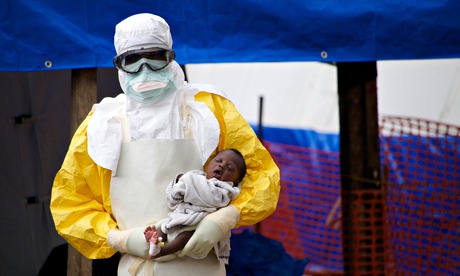
The Disasters Emergency Committee is to launch an unprecedented appeal for help from the public to tackle the Ebola crisis in west Africa, warning that a medical emergency is turning into a humanitarian catastrophe.
The DEC – which appeals in times of crisis on behalf of 13 leading aid charities including the British Red Cross, Oxfam and Save the Children – has never before in its 50-year history asked for help in a single disease epidemic.
The decision to ask for funds through all the main UK broadcasters on Thursday has been taken because Ebola is not just killing people, but destroying livelihoods and communities as well.
“This appeal is completely unprecedented and that is a sign of just how serious the situation in west Africa has become,” said DEC’s chief executive, Saleh Saeed. “In its 50-year history the DEC has launched appeals for humanitarian disasters caused by floods, famines, earthquake, typhoons, and countless conflicts. We have never run an appeal in response to a disease outbreak – until today.
“While many chronic diseases cause untold suffering in poorer countries, the worst acute outbreaks of deadly diseases such as measles or cholera have usually occurred in the wake of another type of disaster. In west Africa today we are seeing a disease create not just a medical crisis, but a humanitarian emergency. Without urgent action to stop the spread of Ebola and to help those affected by the crisis, parts of west Africa face catastrophe within 60 days.”
So far, there have been 10,141 confirmed, probable and suspected cases of Ebola and 4,922 reported deaths – though the figures are widely believed to be two or three times higher. Many people with the disease do not get to a treatment centre and die at home, where they will probably infect family members nursing them. The numbers are doubling every three to four weeks.
By December, the World Health Organisation says there could be as many cases and deaths a week as there have been so far in the entire outbreak in Sierra Leone, Liberia and Guinea. All three countries are very poor, with healthcare that was inadequate even before the outbreak began.
The appeal for funds will support work being undertaken by the charities. This includes safe disposal of bodies – which are highly infectious – tracing the contacts of people who are sick, protecting orphans and children left without families, raising awareness in communities of the risks of infection, providing food, clothing, medical supplies, water and sanitation services and also running some treatment centres.
All the main UK broadcasters will be carrying the DEC appeal, including the BBC, ITV, Channel 4, Channel 5 and Sky. The appeal will also be supported by other DEC partners including ITN, BT, Post Office, British Bankers Association, Royal Mail, RadioCentre and NewsNow.
Donations will be taken on the website www.dec.org.uk or by phone on 0370 60 60 900. Text donations of £5 can be made by texting SUPPORT to 70000.
